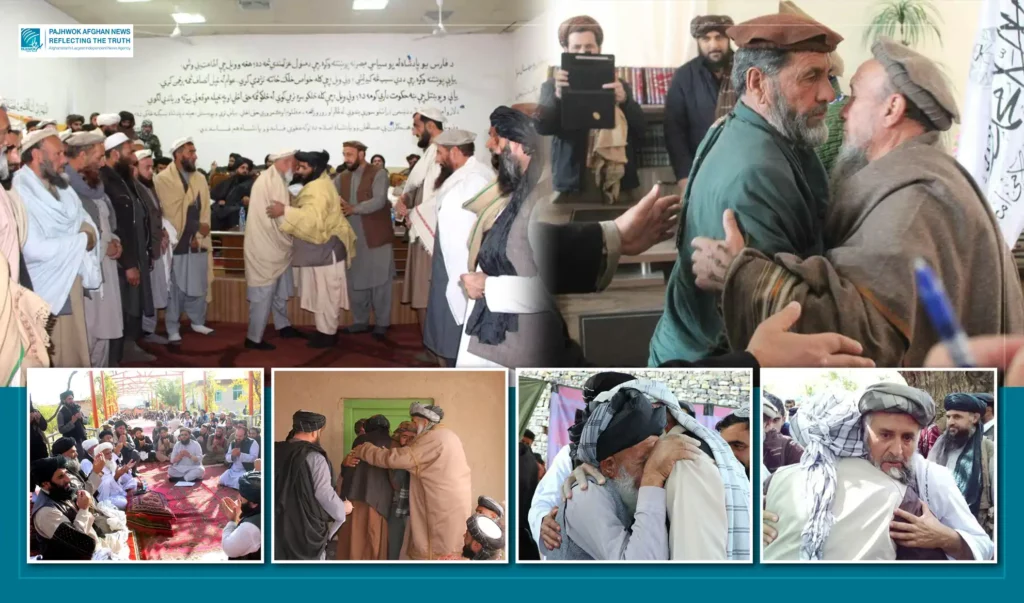KABUL (Pajhwok): The Ministry of Borders and Tribal Affairs (MoBTA) says 1,271 disputes have been resolved with the help of religious scholars and elders across the country since the return of the Islamic Emirate of Afghanistan in 2021.
Most enmities are triggered by land, pasture, forest, water distribution, inheritance and other disputes. Starting with verbal clashes, some of the feuds escalate into long and bloody enmities.
Afghanistan has a long-running tradition of dispute resolution through jirgas, But despite this, some people engage in long and bloody enmities, which take a heavy toll on the parties involved.
1,271 big and small disputes resolved
Sharifullah Sharafat, spokesman for the ministry, told Pajhwok Afghan News 1,271 major and small conflicts had been resolved in Afghanistan since the IEA takeover.
He explained 1,014 people had suffered casualties in the feuds. He said 28 disputes were resolved in 2022, 430 in 2023 and 813 during the ongoing year so far.
Sharafat said 479 big and 792 small enmities had been resolved with the help of local officials, religious scholars and tribal elders.
For instance, he said, the interim government had settled a long-standing conflict between the Kochi tribe and local residents of Maidan Wardak and Bamyan provinces.
He also pointed to ending a 30-year-old conflict in the Aqcha district of Jawzjan, a 91-year-old feud in Nuristan, a 50-year-old enmity in the Achin district of Nangarhar and 20-year enmity in Spinghar district.
He added the reconciliation process was underway, with the ministry striving to address all disputes and enmities and convert them into friendship and brotherhood.
Enmity is misfortune: Parties
On February 18, a three-year-old feud between two families in northwestern Nimroz province, which resulted in the killing of two individuals, came to an end as a result of mediation by local officials, tribal elders and religious scholars.
The enmity between cousins – Haji Wazir Khan and Haji Fazl Ahmad, residents of the Rozi village of Khashrod district, began three years ago.
Both Wazir Khan and Fazl Ahmad lost their brothers in the feud.
Ahmad, brother of slain Ali Ahmad, told Pajhwok war meant bloodshed and he was willing to forgive the killer and his relatives. He promised living in an atmosphere of peace and brotherhood from now on.
Meanwhile, Wazir Khan, brother of the victim (Mohammad Reza), also voiced happiness over the enmity being resolved.
On Feb. 15, a 12-year-old enmity between Malem Abdul Qadir and Najib’s families in Kama district was also settled.
Abdul Qadir, whose family lost two people to this enmity, expressed happiness over reconciliation and thanked the mediators.
He remarked: “We are cousins, but hypocrites fanned differences between us. I pray to Allah to expose them. I’m very happy being reunited with my cousins today.”
Peace is a blessing
Religious scholar Abdul Malik Rashid told Pajhwok Islam is the religion of brotherhood and insists on peace among its followers.
Due to conflicts, unwholesome traditions and ignorance in Afghanistan, some families had been in enmity with each other for years, but no steps were taken to solve them, he said.
IEA had taken effective steps in the past two years towards reconciliation, unity and brotherhood among Afghans, the scholar acknowledged.
“Disagreements and enmity come aplenty. Feuding families don’t enjoy life, because they live in fear and lose members of their families. They have a miserable life.
“I request all such families to forgive each other and approach IEA for dispute resolution so that we can bring back peace and friendship to the country,” he added.
He commented peace was good both in this world and in the hereafter. It is also beneficial for future generations to lead a prosperous life.
sa/mud








GET IN TOUCH
NEWSLETTER
SUGGEST A STORY
PAJHWOK MOBILE APP